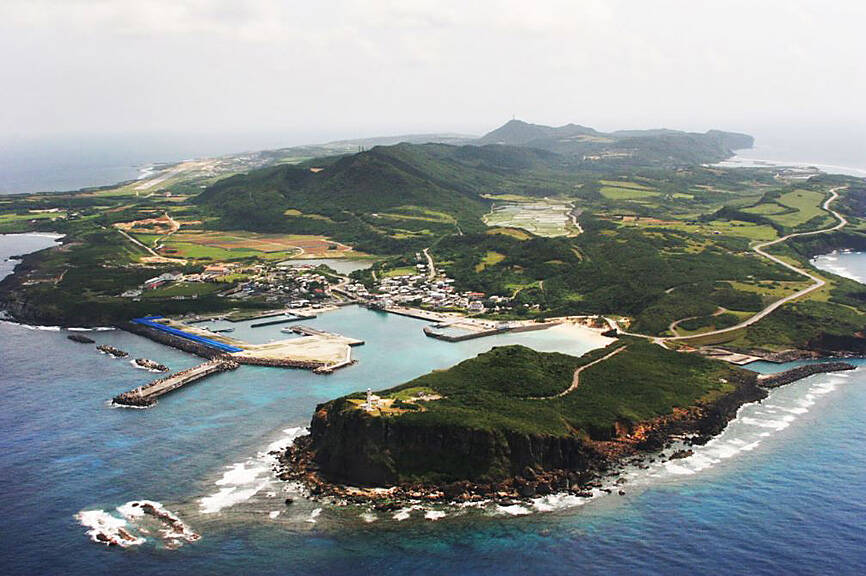Japanese Minister of Defense Shinjiro Koizumi, visiting a military base close to Taiwan, said plans to deploy missiles to the post would move forward as tensions smolder between Tokyo and Beijing.
“The deployment can help lower the chance of an armed attack on our country,” Koizumi told reporters on Sunday as he wrapped up his first trip to the base on the southern Japanese island of Yonaguni. “The view that it will heighten regional tensions is not accurate.”
Former Japanese minister of defense Gen Nakatani in January said that Tokyo wanted to base Type 03 Chu-SAM missiles on Yonaguni, but little progress has been made so far. The truck-launched missiles are designed to counter air threats up to 48km away.

Japanese Minister of Defense Shinjiro Koizumi, center, speaks during a visit to Yonaguni, Japan, on Sunday.
Photo: Bloomberg
Koizumi on Sunday said that the ministry was still working on the plan, and would share details with the local government and people of Yonaguni when details are finalized.
The plan to station medium-range surface-to-air missiles on Yonaguni, about 110km east of Taiwan, comes as part of a broader military buildup on its southern island chain. The moves reflect Tokyo’s concerns about China’s growing military power and the potential for a clash over Taiwan.
When China responded to a visit to Taiwan by then-US House of Representatives speaker Nancy Pelosi in 2022 by launching major military drills, ballistic missiles landed just south of Yonaguni, providing a stark illustration of the proximity of the island to any conflict for control of Taiwan.

A general view of Japan’s Yonaguni island is pictured in an undated photograph.
Photo: Reuters
Japan’s fears of being embroiled in a Taiwan conflict were amplified by a dispute over comments by Japanese Prime Minister Sanae Takaichi related to Taiwan, which Beijing regards as a province that must be brought under its control, by force if necessary.
Takaichi on Nov. 7 raised the theoretical possibility that Japan could deploy its military with other nations if China attacked Taiwan, drawing an angry response and economic retaliation from Beijing.
She has since reverted to the Japanese government’s longstanding policy of not discussing particular scenarios that might involve Tokyo’s military, but Beijing continues to demand a retraction.
A Japanese official on Saturday rejected China’s claims that Takaichi has altered Japan’s position on a Taiwan crisis as “entirely baseless.”
When asked at the weekend about the potential impact on Yonaguni of a Taiwan crisis, Koizumi said he would not comment on hypothetical scenarios.
Before arriving in Yonaguni, Koizumi visited bases on the islands of Ishigaki and Miyako. The Ishigaki base is equipped with anti-ship missiles, while Miyako is a hub for air surveillance and other military facilities, including ammunition storage. Japan and the US also have major bases on the larger island of Okinawa further to the east.
Yonaguni is the end point of the Ryukyu island chain that stretches from the Japanese mainland.
A popular tourist retreat, including for scuba divers, Yonaguni is also home to a surveillance radar facility that scans nearby seas and airspace, as well as an electronic warfare unit introduced last year that could be used to jam enemy communications and guidance systems.
The US military earlier this month held a training exercise to bring supplies from Okinawa to Yonaguni to simulate the creation of a forward-operating base that might be needed in any regional crisis.
In a meeting with the mayor of Yonaguni, Koizumi said Japan has to build up its deterrence by increasing its own capabilities and deepening ties with the US military.
“Today, Japan faces the most severe and complex security environment since the end of World War II,” Koizumi said. “To protect the peaceful livelihoods of the Japanese people — including everyone here on Yonaguni — we must strengthen the Self-Defense Forces’ capabilities.”
Beijing yesterday slammed Japan’s decision to push ahead with the planned deployment of missiles on the island.
The Chinese Ministry of Foreign Affairs said that Japan’s missile deployment was a “deliberate attempt to create regional tension and provoke military confrontation.”
“Coupled with Prime Minister Sanae Takaichi’s erroneous remarks on Taiwan, this trend is extremely dangerous, and warrants high vigilance from neighboring countries and the international community,” ministry spokeswoman Mao Ning (毛寧) said at a regular news conference.
Taiwan yesterday said that Japan’s strengthening of military facilities on Yonaguni “helps maintain security in the Taiwan Strait.”
“Japan is a sovereign country and it has the right to do everything necessary to protect the security of its own territory, as long as such actions do not threaten other countries,” Deputy Minister of Foreign Affairs Francois Wu (吳志中) said.
As Yonaguni is very close to Taiwan, strengthening military facilities helps maintain security in the Taiwan Strait, he added.
Since Japan has no territorial intentions or hostility toward Taiwan, this move benefits Taiwan’s national interests, he said, adding that as Taiwan is also a nation with similar values, both sides would continue to cooperate to maintain regional peace and stability.
Meanwhile, Wu, yesterday at a meeting of the legislature’s Foreign Affairs and National Defense Committee was asked by lawmakers about the US China Economic and Security Review Commission reportedly calling for Taiwan to fund the upgrading of US military bases in the Philippines.
While such a policy proposal exists, it is merely a suggestion and can be discussed, Wu said.
Additional reporting by CNA and AFP
Source: Taipei Times - 2025/11/25




















